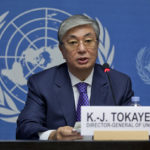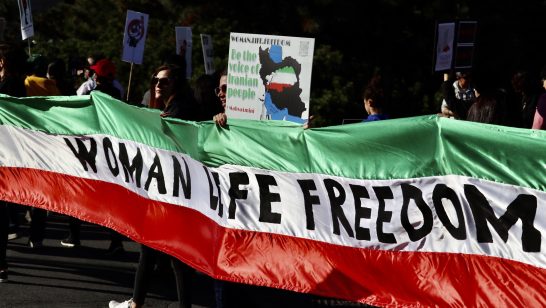
London, Tuesday, 13 November 2012
Excellencies,
Distinguished Ladies and Gentlemen:
I thank the European Leadership Network for inviting me and giving me the opportunity to brief on developments related to a possible Fissile Material Cut-off Treaty – FMCT – and, in particular, on the role that the Conference on Disarmament plays in this process.
Member States, both at the CD and in the First Committee of the United Nations General Assembly, have undertaken significant efforts to commence a negotiation process on an FMCT.
There have been a number of working papers which have contributed to discussion on the objectives and definitions of the scope and provisions of an FMCT. In addition, Australia, Germany Japan and the Netherlands organized expert side events and scientific meetings throughout 2011-2012 to build confidence on an FMCT, and momentum towards treaty negotiations. They have been exploring the technical aspects of banning the production of fissile material and verifying fissile materials and production facilities, as well as the possible legal structure of an FMCT, and organizational issues.
The 67th session of the General Assembly’s First Committee concluded its work last week. The Committee adopted three resolutions which, if approved by the General Assembly next month, will have a direct impact on the work of the CD in the field of nuclear disarmament, including on an FMCT.
By one of these resolutions, the General Assembly will establish in 2013 an open-ended working group to develop proposals to take forward multilateral negotiations on nuclear disarmament.
By the other resolution, the General Assembly will establish in 2014 a group of governmental experts, which will work for two years and “taking into account the report containing the views of Member States, will make recommendations on possible elements that could contribute to a treaty banning the production of fissile material for nuclear weapons or other nuclear explosive devices” on the basis of the Shannon mandate.
The third resolution deals with the CD’s annual report. It was adopted without a vote, and calls for renewed efforts to overcome the impasse. For most States, overcoming the impasse in the CD would involve the start of negotiations on an FMCT.
From my point of view, it remains to be seen whether the creation of the two new groups will change the dynamics, pace and scope of discussions. It is a new departure for groups mandated by the General Assembly, and therefore with the broader General Assembly membership, to discuss CD-related subjects in Geneva. It could help to build confidence and legitimize the discussions.
There is no need to say that although Member States have divergent views on the methodological approach and the scope of the future treaty, the overwhelming majority have expressed their support for negotiations. There is also a common understanding that any instrument on fissile materials should include all key actors, including all countries that have declared their possession of nuclear weapons.
Let me now turn to the wider related issue of the CD itself.
There is no doubt that a revitalized CD is an important step for serious negotiations on the FMCT. We therefore need look at the Conference on Disarmament as an instrument, and most importantly, at the issue of political will and how this is played out in the Conference.
Some have suggested that the structure of the Conference on Disarmament, including its limited membership and consensus rule, constitutes part of the problem. As Secretary-General of the CD, I have personally advocated a closer and more critical look at the procedures of the Conference.
Specifically, I suggested in February this year extending the term of the Presidency, expanding the membership, and including more items on the agenda.
Let us be clear. I do not believe that procedural measures, in and of themselves, can change the political dynamics that currently preclude negotiations. I am nevertheless of the view that they can be politically significant in creating greater confidence and helping to introduce a different way of working in the Conference.
I remain convinced that the Conference on Disarmament remains indispensable for moving multilateral disarmament ahead, including an FMCT. The reasons for the current impasse do not result from any one structural flaw alone. We will not achieve a meaningful FMCT by taking the issue out of the Conference on Disarmament.
My view as the Secretary-General of the CD is that we need flexibility. I do not believe that we can sit and wait for political will to appear. We need to generate and facilitate political will through a number of avenues. The aim would not be to take FMCT out of the Conference but to help generate momentum outside of the Conference for movement within the Conference.
We also need to continue pursuing confidence-building measures, which are the cornerstone of success in the work of the CD. This involves promoting greater trust, openness and team work among the Member States of the Conference. It could also include identification and implementation of international security assurances and existing commitments in military-related matters that may increase trust among States.
Third, and most importantly, we need to raise awareness at the highest political levels. This is my main point to you today. Here I see a particularly valuable role for a committed group such as the ELN. To really make progress, disarmament and indeed the Conference on Disarmament must be included in bilateral and multilateral discussions at the levels of Heads of State and Government and Foreign Ministers.
Let me give you a practical example. I participated in the Seoul Nuclear Security Summit in March of this year. Only the Secretary-General, Mr. Ban Ki-moon, and two other leaders mentioned the Conference on Disarmament.
The G-20 and other key forums where world leaders come together should focus on the CD and an FMCT. But, in reality there is dwindling interest in the CD and the process towards an FMCT.
This is deeply regrettable and must change.
Thank you.
The opinions articulated above represent the views of the author(s), and do not necessarily reflect the position of the European Leadership Network or any of its members. The ELN’s aim is to encourage debates that will help develop Europe’s capacity to address the pressing foreign, defence, and security challenges of our time.


